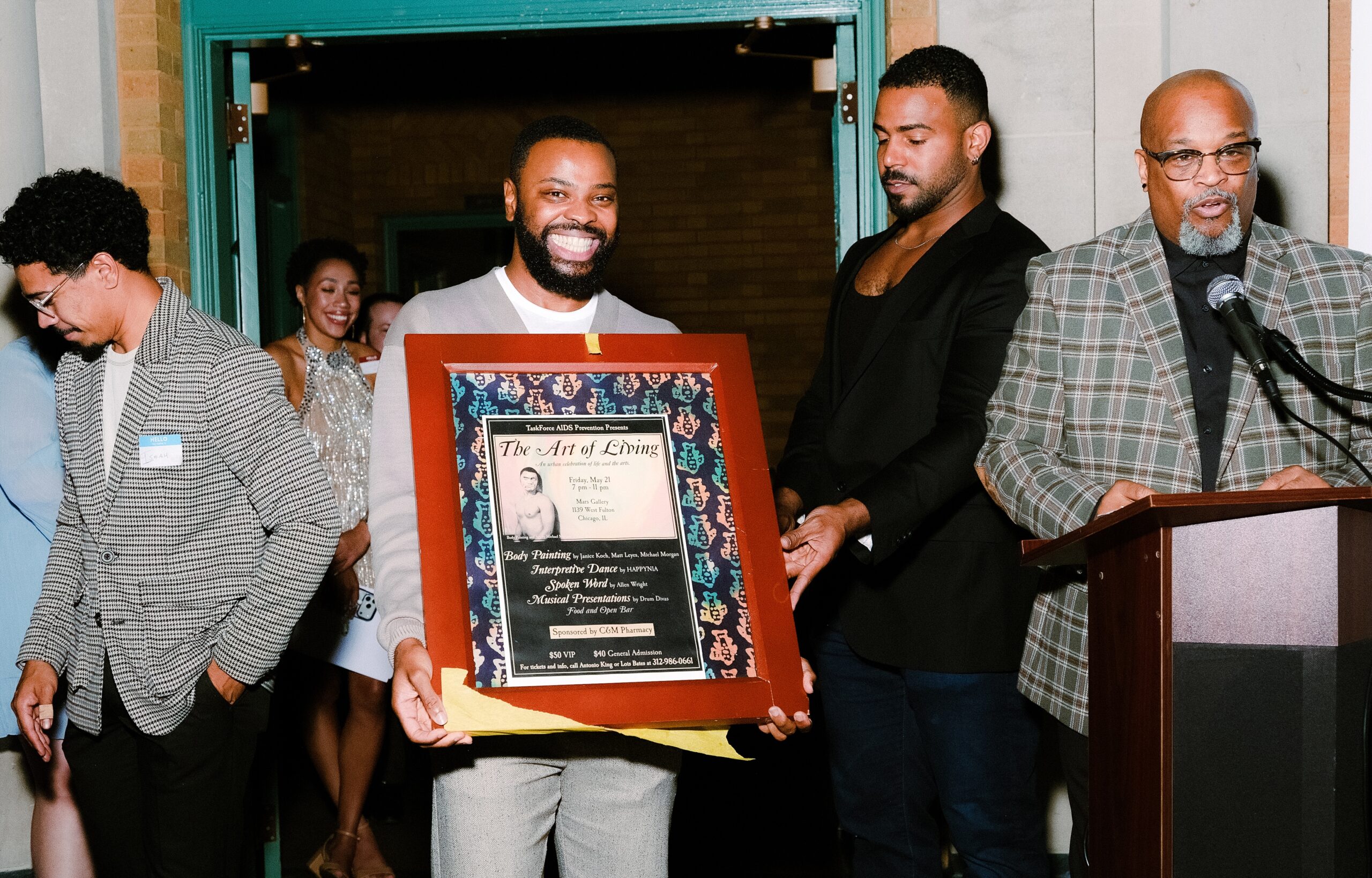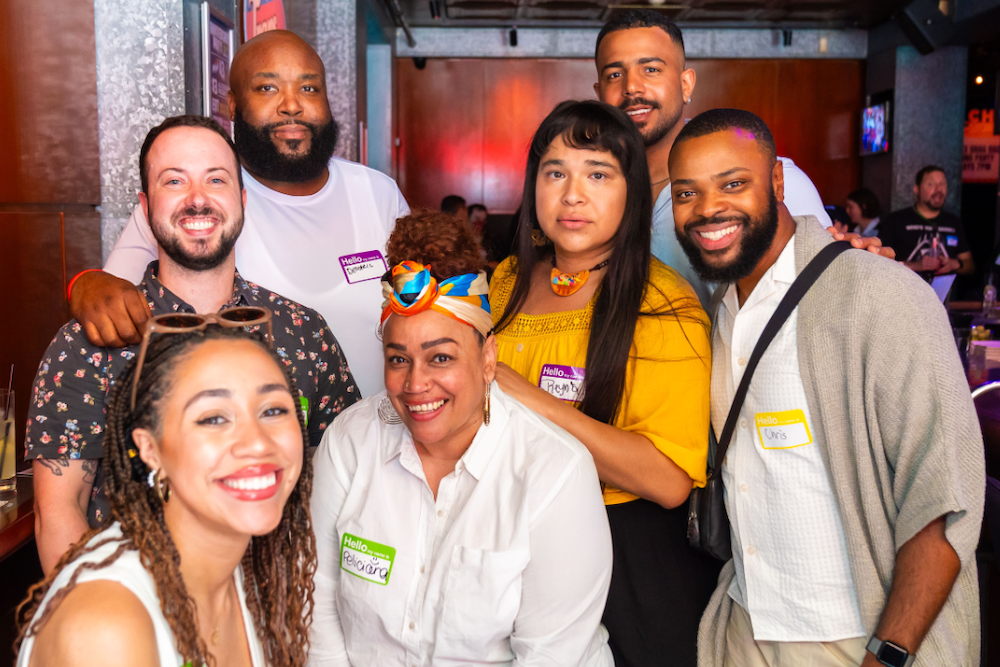The Journey of Dr. Chris Balthazar to Executive Director
Chris Balthazar’s journey to leading TaskForce Prevention and Community Services began in an unexpected place: when he was a graduate student in clinical psychology, working part-time at a Chase Bank.
A Chicago native, he’d returned to the city after earning his undergraduate degree at Dillard University in New Orleans. College had been a transformative experience for Chris, one that revealed to him how affirming spaces were essential for healthy identity and development.
“As a Black gay man growing up in Chicago,” says Chris, “I often felt like a unicorn in my community. I felt like the only Black gay man at my high school, and that there was no one like me.” At the time, that sense of isolation felt absolute, though he later learned there were other LGBTQ+ students at his school.
It was at university that Chris was finally free to explore his full self. “There were other gay people on campus; it was an opportunity to figure out what kind of ‘gay am I?’”
When he returned to Chicago, Chris was hungry. He knew he wanted to work in psychology, but he wasn’t sure what that meant. Private practice? A clinical setting?
“I felt like I wanted to have a bigger impact,” Chris reflects, “And it was sort of the nonprofit space that initially made me think, well, maybe something there? Maybe I could take these skills and put them to good use. I didn’t know what was possible, but I was interested; I was intrigued.”
While juggling graduate school and a part-time job at the bank, Chris struck up an easy rapport with a regular customer who noticed the psychology textbook tucked behind his teller window. They chatted; she slid a business card across the counter and said, “You should call me.” The customer, it turned out, was TaskForce’s Executive Director at the time — and that chance exchange would change Chris’ path in ways he never imagined.

After learning more about the organization, Chris was eager to volunteer. “I just really connected with the mission and the work because I lived it. It’s so important for our psychological development to be able to affirm our identity and build a sense of community with people who are like us. I saw that TaskForce was providing that for so many, and it was something that I wish I had when I was in high school.”
Not long after that fateful business card exchange, Chris began volunteering at TaskForce, passing out condoms and health information in Northalsted nightclubs. As his career advanced, he became a research assistant at Cook County Hospital, where he partnered with TaskForce on projects ranging from clinical studies to community-engaged initiatives. Over the next 15 years, he built close connections with TaskForce board members, staff, and youth.
“With my research, I was able to center community and gain some familiarity and rapport with the people that TaskForce serves. I was able to understand how to center them, to center community, and how that’s so important for a grassroots organization.”
In 2020, after a period of transition, TaskForce’s board asked Chris to step in as interim Executive Director.
“At the time, I didn’t really know what that meant,” Chris admits, “So I often say that I walked into this blindly, not really understanding the role and responsibilities of an Executive Director. I learned it on the job.”
Though Chris may not have realized it initially, his background in research, grant writing, and project management would help him stabilize and grow the organization. Much of that research work also centered on collaboration and community building, skills that proved just as essential as technical expertise. At the time, TaskForce was struggling: it had lost its 501(c)(3) status, was operating at a deficit, and was months behind on rent and utilities. Then the COVID-19 pandemic hit.
Under Chris’s leadership, TaskForce pivoted to become a vital COVID testing site—the only one on the West Side at the time—and later a vaccination site in partnership with the Chicago Department of Public Health and Howard Brown. When mpox emerged, TaskForce again responded quickly, offering testing and vaccinations in collaboration with Rush and UIC.
“There was one time, when we were responding to mpox, we had lines around the block from people getting vaccinations,” Chris recounts, “What’s so amazing about this organization and our grassroots identity is that we’re able to morph into what the community needs at the moment.”
Chris also brought TaskForce back to financial stability. By rebuilding grant funding, strengthening partnerships, and expanding programming, he positioned TaskForce not just to survive but to grow. Programs in wellness, leadership development, and community-building flourished, and the organization regained its nonprofit status.
For Chris, the journey from community volunteer to Executive Director has been deeply personal. As someone who once longed for spaces like TaskForce, he now has the privilege of sustaining and expanding them for a new generation.
Looking back at his younger self—working at the bank and hungry to make an impact—Chris says he would remind that version of himself to trust his instincts. “My gut was telling me to get involved, to do more, to learn more, to explore more, and I’m glad I did that.”

Today, as Executive Director of an organization with a 35-year legacy, Dr. Chris Balthazar leads with both skill and heart, ensuring that LGBTQ+ youth on Chicago’s West Side have the affirming spaces and resources they deserve.
“This is my dream job,” states Chris, “And it’s weird because I didn’t know it, I didn’t see it. I knew what an executive director or a CEO was, but I didn’t see that in my future. I thought that I needed to take a more traditional path. But by being open-minded, trusting my gut, and following my passion, I was led here. Because of that, I get to do this work every day, and it doesn’t even feel like work.”

